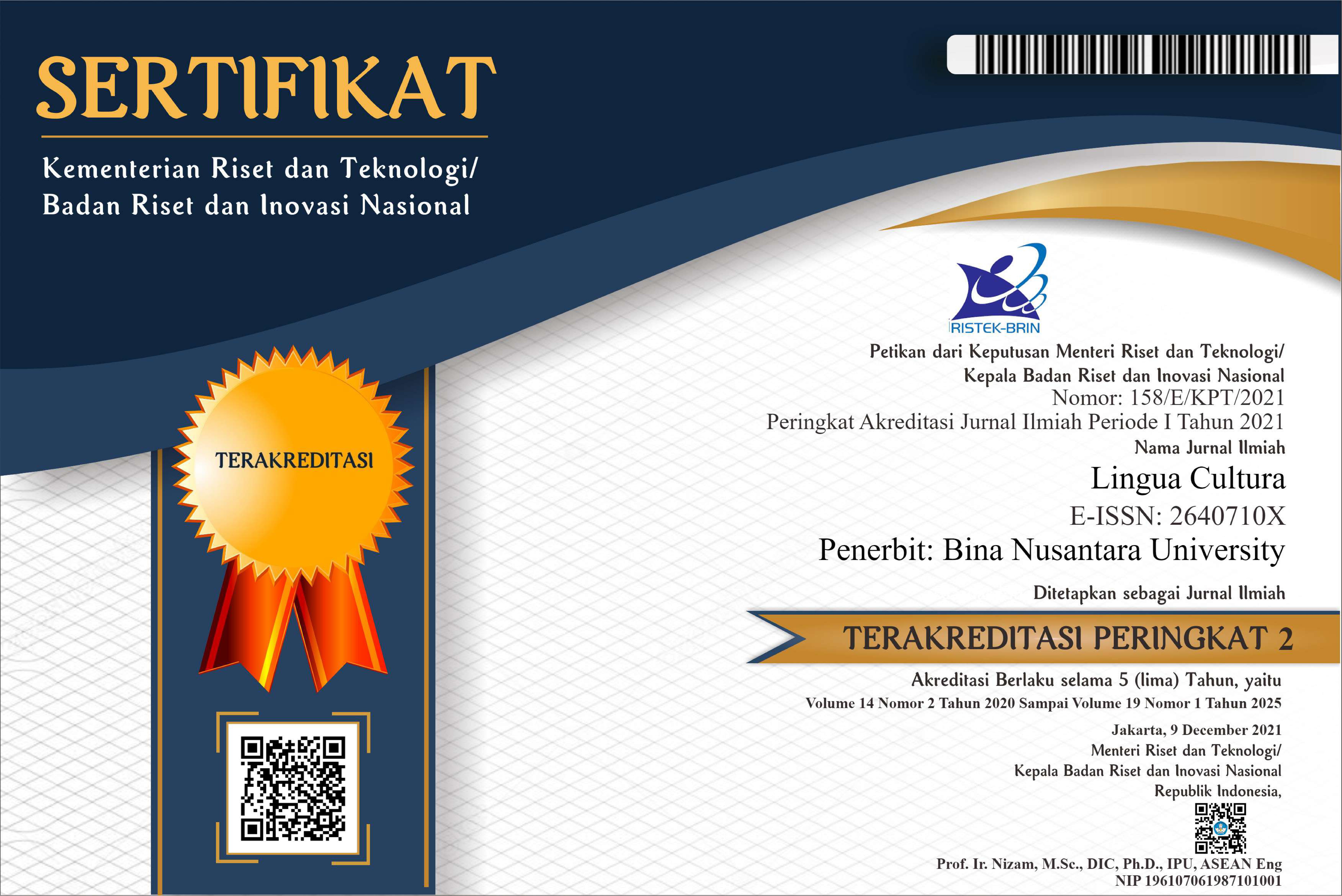Enjoying Learning Writing through Facebook Group
DOI:
https://doi.org/10.21512/lc.v13i1.5513Keywords:
learning enjoyment, learning writing, Facebook groupAbstract
This research showed the English as a Foreign Language (EFL) students in Aceh who struggle in learning English writing as they had a lack of interest in it. This descriptive qualitative study aimed to find out in what ways Facebook Group facilitate the enjoyment of the students in learning this skill. Data were collected using interviews and analyzed through thematic analysis. Ten students from UIN Ar-Raniry were purposely chosen for the interviews that was done one by one at a time. The research findings show that there are four themes causing participants enjoyment of the learning writing in the group: (1) it provides unlimited timing; (2) it facilitates the participants’ freedom and creativity; (3) it provides the interactive feedback; and (4) it helps them in brainstorming the ideas. These four themes directly enhance the students’ situational interest in learning writing related to an environmental factor, but it results in the development of their individual interest. This research suggests that the teacher should combine the learning process in the classroom with the Facebook group media to fasten the enhancement of the learners’ writing skills. For the learners, it is suggested that they should utilize their social media such as Facebook group not only as their communication media but also for developing their learning in writing.
Plum Analytics
References
Bani-Hani, N. A., Al-Sobh, M. A., & Abu-Melhim, A. R. H. (2014). Utilizing Facebook groups in teaching writing: Jordanian EFL students’ perceptions and attitudes. International Journal of English Linguistics, 4(5), 27-34.
Fareed, M., Ashraf, A., & Bilal, M. (2016). ESL learners’ writing skills: Problems, factors, and suggestions. Journal of Education & Social Sciences, 4(2), 82-93.
Global Digital Report (2018). We are social. Retrieved from https://digitalreport.wearesocial.com.
Gonulal, T., & Loewen, S. (2018). Scaffolding technique. In The TESOL Encyclopedia of English Language Teaching, 1st Edition. Liontas, J. I. (Ed.). Hoboken, NJ: John Wiley & Sons.
Harackiewicz, J. M., Smith, J. L., & Priniski, S. J. (2016). Interest matter: The importance of interest in education. Policy Insights Behavioral and Brain Sciences, 3(2), 220-227.
Hidi, S., & Renninger, K. A. (2006). The four-phase model of interest development. Educational Psychologist, 41(2), 111-127.
Khan, I. U., Ayaz, M., Khan, S., Shah, S. F., & Ullah, M. (2016). Facebook effect on enhancement of English learners’ writing approach at university level in Khyber Pakhtunkhwa. Journal of Literature, Languages and Linguistics, 28, 46-53.
Li, V. (2017). Social media in English language teaching and learning. International Journal of Learning and Teaching, 3(2), 148-153.
McCarthy, J. (2014). Learners’ interest matters: Strategies for empowering students choice. Retrieved on March 9th 2019 from https://www.edutopia.org/blog/differentiated-instruction-learner-interest-mattersjohn-mccarthy.
Mısır, H., Koç, D. K., & Koç, S.E. (2018). An analysis of learner autonomy and autonomous learning practices in massive open online language courses. Arab World English Journal (AWEJ): Special Issue on CALL, 4, 24-39. doi: https://dx.doi.org/10.24093/awej/call4.3.
Mohajan, H. K. (2018). Qualitative research methodology in social sciences and related subjects. Journal of Economic Development, Environment and People, 7(1), 23-48.
Noriah, I., Hussin, S., & Darus, S. (2012). ESL students’ attitude, learning problems, and needs for online writing. GEMA OnlineTM Journal of Language Studies, 12(4), 1089-1106.
Ramadhani, P. (2018). Using Facebook comments in teaching writing skill. Proceedings of The ICECRS, 1(3) 253-264.
Reinders, H., & White, C. (2016). 20 years of autonomy and technology: How far have we come and where to next? Language Learning & Technology, 20(2), 143–154.
Sabouri, H., Zohrabi, M., & Vafa, A. (2014). Genre-based approach to teaching writing in EFL context. International Journal of Applied Linguistic Studies, 3(1), 1-7.
Scott, C. M., & Glaze, N. (2017). Homework policy and students choice: Finding from a Montessori Charter school. Journal of Montessori Research, 3(2), 1-18.
Subramaniam, P. R. (2009). Motivational effects of interest on student engagement and learning in physical education: A review. International Journal of Physical Education, 46(2), 11-19.
Sulisworo, D., Rahayu, T., & Akhsan, R. N. (2016). The students’ academic writing skill after implementing blended learning using Facebook. Information Technologies and Learning Tools, 56(6), 176-191.
The Jakarta Post (2018). Indonesia, fourth highest number of Facebook users in the world. Retrieved from https://www.thejakartapost.com/life/2018/03/04/indonesiafourth-
highest-number-of-facebook-users-in-theworld.html. on 08 March 2019.
Yu, L. (2014). A case study of using Facebook in an EFL English writing class : The perspective of a writing teacher. JALT CALL Journal, 10(3), 189–202.
Zheng, B., Yim, S., & Warschauer, M. (2018). Social media in the writing classroom and beyond. In The TESOL Encyclopedia of English Language Teaching, 1st Edition, Liontas, J. I. (Ed.). Hoboken, NJ: John Wiley & Sons.
Downloads
Published
Issue
Section
License
Authors who publish with this journal agree to the following terms:
a. Authors retain copyright and grant the journal right of first publication with the work simultaneously licensed under a Creative Commons Attribution License - Share Alike that allows others to share the work with an acknowledgment of the work's authorship and initial publication in this journal.
b. Authors are able to enter into separate, additional contractual arrangements for the non-exclusive distribution of the journal's published version of the work (e.g., post it to an institutional repository or publish it in a book), with an acknowledgment of its initial publication in this journal.
c. Authors are permitted and encouraged to post their work online (e.g., in institutional repositories or on their website) prior to and during the submission process, as it can lead to productive exchanges, as well as earlier and greater citation of published work.
USER RIGHTS
All articles published Open Access will be immediately and permanently free for everyone to read and download. We are continuously working with our author communities to select the best choice of license options, currently being defined for this journal as follows: Creative Commons Attribution-Share Alike (CC BY-SA)

















